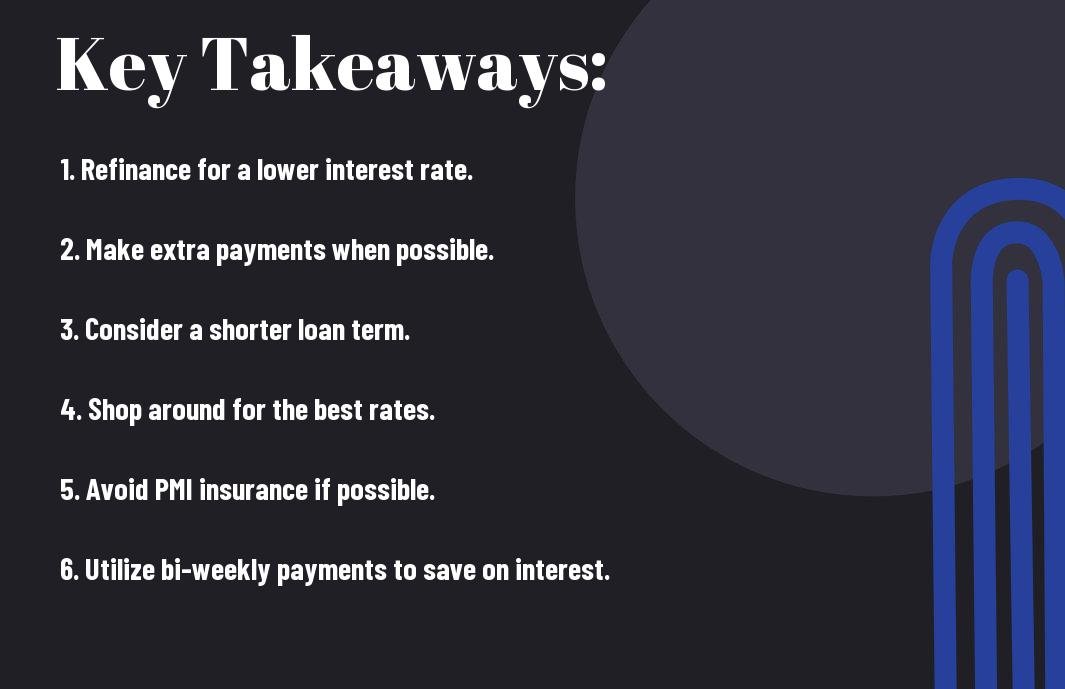With the challenging economic climate, finding ways to save money on your mortgage payments can be a huge relief. Whether you are a first-time homebuyer or looking to refinance, these tips will help you cut costs and ease your financial burden. Let’s investigate into some practical strategies that can help you secure a better financial future.
Key Takeaways:
- Refinance: Consider refinancing your mortgage to take advantage of lower interest rates, potentially saving you money on your monthly payments.
- Make Extra Payments: By making extra payments towards your mortgage principal, you can reduce the overall amount of interest you pay over time.
- Shop Around: Compare offers from different lenders to find the best deal and potentially lower your monthly mortgage payment.
Refinance Your Mortgage
Shop lenders
Your first step in refinancing your mortgage is to shop around for lenders who can offer you the best rates and terms. Assuming you already have a mortgage, you may want to start by checking with your current lender to see if they can offer you a better deal. Don’t be afraid to reach out to multiple lenders to compare offers and find the most competitive rates.
Compare rates
On top of shopping lenders, comparing rates is crucial in saving money on your mortgage payments. By comparing interest rates, you can potentially find a lender who is willing to offer you a lower rate than what you’re currently paying. This can result in significant savings over the life of your loan.
Shop lenders
| Pros | Cons |
Compare rates
| Benefits | Considerations |

Make Extra Payments
Lump-sum contributions
On occasions when you receive a windfall, such as a tax refund or a work bonus, consider putting a portion of that money towards a lump-sum payment on your mortgage. These single large payments can reduce the principal amount of your loan, helping you save on interest charges over time.
Monthly overpayments
Clearly, making monthly overpayments on your mortgage can significantly reduce the amount of interest you end up paying over the life of the loan. Even a small additional amount each month can add up and help you pay off your loan faster. It’s a simple way to chip away at your principal balance and decrease the term of your mortgage.
By consistently making extra contributions to your mortgage, whether through lump-sum payments or monthly overpayments, you can make a substantial impact on your overall interest costs and shorten the time it takes to pay off your loan. It’s a wise strategy to consider if you want to save money in the long run.
Choose Biweekly Payments
Half-payments biweekly
Biweekly payments can help you save money on your mortgage by making half-payments every two weeks instead of one full payment each month. This results in 26 half-payments or 13 full payments per year, which can help you pay off your mortgage faster and reduce the amount of interest you pay over time.
Reduce interest
While making biweekly payments can help you save on interest by reducing the principal amount faster, another way to reduce interest is by making extra payments towards your mortgage. By putting additional funds towards your loan each month, you can reduce the overall amount of interest paid and shorten the life of your loan.
Choose biweekly payments to save money on your mortgage and pay off your loan sooner. By making half-payments every two weeks and reducing interest through extra payments, you can take control of your mortgage payments and save in the long run.
Extend Your Term
Lower payments
Now, one way to save money on your mortgage payments is by extending your term. By spreading out your payments over a longer period of time, you can lower your monthly payments and free up some cash flow each month.
More interest
Extend your term, and you will end up paying more interest over the life of the loan. However, this can still be a good option if you are looking to lower your immediate financial burden.
This approach allows you to have more flexibility with your finances in the short term, as you will have lower payments each month. While you may end up paying more in interest overall, the ability to manage your cash flow effectively now may outweigh this in the long run.

Review Property Taxes
Challenge Assessments
Not happy with the property tax assessment on your home? You have the right to challenge it! Assuming you believe your home is overvalued, you can present evidence such as recent sale prices of comparable homes in your area to try and lower your property tax bill.
Seek Exemptions
Not sure if you’re taking advantage of all the exemptions available to you? You could be missing out on potential savings! You may qualify for exemptions based on factors like age, disability, veteran status, or even energy-efficient upgrades to your home. You can contact your local tax assessor’s office to see if you qualify and how to apply.
You can also check if there are any homeowner association (HOA) fees included in your property tax bill and make sure you are not paying double for certain services.
Reduce PMI
Private Mortgage Insurance (PMI) is a type of insurance that protects the lender in case the borrower defaults on the loan. It is typically required for buyers who put down less than 20% when purchasing a home. PMI can add a significant amount to your monthly mortgage payment, but there are ways to reduce or eliminate it.
Home value increase
On the bright side, if the value of your home has increased since you bought it, you may be able to cancel your PMI. Typically, lenders require that your loan-to-value ratio reach 80% before you can request the cancellation of PMI. You can get a new appraisal to determine the current value of your home and see if you meet the criteria to eliminate PMI.
Mortgage balance reduction
Any extra payments you make towards your mortgage go directly towards reducing your principal balance. By making additional payments each month or putting lump sums towards your mortgage, you can pay down your loan faster. As your mortgage balance decreases, your loan-to-value ratio improves, which may help you eliminate PMI sooner.
The key to reducing PMI is to stay informed about your home’s value and your mortgage balance. By taking proactive steps to increase your home’s value and pay down your mortgage, you can save money on your monthly mortgage payments in the long run.
Utilize Mortgage Points
Buy Points
For those looking to save money on their mortgage payments, buying points could be a smart strategy. Mortgage points are necessaryly pre-paid interest on the loan, with each point equal to 1% of the total loan amount. By purchasing points upfront, borrowers can lower their interest rates and ultimately reduce their monthly payments.
Long-term savings
On the surface, buying points may seem like an added expense, but the long-term savings can be significant. By reducing the interest rate on your mortgage, you can save thousands of dollars over the life of the loan. This could mean lower monthly payments and more money in your pocket in the long run.
Any decision to buy points should be carefully considered and based on your individual financial situation. It’s important to calculate whether the upfront cost of points will be outweighed by the savings in the long term. Consulting with a financial advisor or mortgage expert can help you determine if buying points is the right choice for you.
Conclusion
The key to saving money on your mortgage payments is to take advantage of various strategies such as refinancing, making extra payments, and choosing the right loan term. By being proactive and exploring different options, you can potentially save thousands of dollars over the life of your loan. Remember to continuously monitor your financial situation and stay informed about the housing market to make the most out of your mortgage payments.
